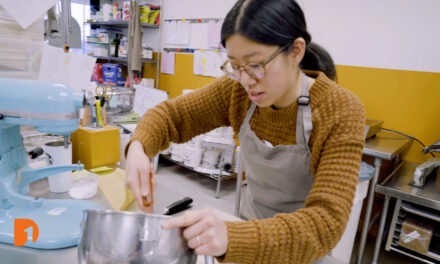Venturing into the world of entrepreneurship comes with challenges. However, for Black women entrepreneurs, the hurdles can be much higher and different. A study from the National Association of Women Business Owners shows 42% of U.S. businesses are owned by women, yet those businesses grow at only half the rate as businesses owned by men. To learn more about the unique challenges African American women entrepreneurs face, “American Black Journal” host Stephen Henderson spoke with two Black women entrepreneurs from Detroit.
RELATED: Detroit United Front forms to build better equity, inclusion for Black businesses
RELATED: Small business workshop covers business recovery, sustainability amid COVID
Linda Hendricks, co-founder of the Detroit Dance Center, and Chinonye Akunne, the owner of ILERA Apothecary, join Henderson to discuss what led them to become entrepreneurs and share their advice for budding business owners. Plus, they talk about the financial and marketing grants they received through Comcast RISE, a program created during the pandemic to assist small businesses owned by women and people of color.
Full Transcript:
Stephen Henderson, Host, American Black Journal: Linda and Chinonye, welcome to “American Black Journal.”
Linda Hendricks, Co-Founder, Detroit Dance Center: Yes. Thank you for having us.
Stephen Henderson: So, I always think that one of the most daring things you can ever do in life is to go out on your own and start a business, decide that you’re going to fair for yourself out in the market economy. Of course, that looks really different for people of color than it does for the majority population, and it looks really different for women than it does for men. So, you both face both of those challenges. I want to start with both of you just kind of telling your story, how you came to decide that this was for you and what you ended up creating. Linda, I’ll start with you.
Linda Hendricks: Okay, sure. So, I’m one of the co-owners of Detroit Dance Center. We are located in midtown Detroit. And myself and my two other partners, Dominique and Jasmine, we all used to teach together. We taught dance together at a dance studio in Detroit. We taught together, I was a teacher, they were students, and then we all became teachers, and then the pandemic happened. And so, we were kind of on a hiatus.
Everybody was sitting at home in Zoom classes and everything like that. It started off as just a little playful banter if I had a studio, I would do this, if I had a studio, I would do that. The discussion became a little serious. Moving forward, next thing you know, about a year later, we opened up our studio in September of 2021, and it was kind of we were trying to figure it out during the pandemic, but that’s how we all got started.
Stephen Henderson: Yeah, and what were some of the risks, I guess, that you felt or some of the challenges that you faced in making that decision?
Linda Hendricks: Oh, definitely, yeah. The pandemic, that’s really what it was.
Stephen Henderson: We’ll start there, right?
Linda Hendricks: Yeah, it was really that. We were thinking would parents want their kids to be around other kids so close? And, if we had classes, how many kids can we put in a classroom and work on social distancing? So, it was really unknown how the public would react. Would we have students, starting in 2021, that would want to be in-person and not have to do virtual dance classes?
Stephen Henderson: Yeah. Chinonye, tell us how you came to decide to be an entrepreneur.
Chinonye Akunne, Founder, Ilera Apothecary: Yeah. So, I always tell people entrepreneurship found me. And I say that because about eight years ago my brother came to me needing a natural deodorant. He was changing his lifestyle, changing his diet, and was going vegan. So, he wanted something that was vegan and that actually worked. At the time, I studied chemistry in college, I also got my master’s in public health. And so, I was–always been tinkering with formulas and things like that.
So, I was able to make it for him. And on this journey of making this natural deodorant, I realized that some of the chemicals in my workplace, I was working at a global automotive company at the time, I was making sure we were by weighting the chemicals that were coming into our plants, and some of I saw a lot of crossing. And so, I said, “If I’m banning this from coming into a plant because it’s unsafe for people to work in a large manufacturing environment, then why are we putting it on our skin?” Even though it’s at smaller doses, but we’re still doing that every single day and that’s just compounding onto us.
And so, I was like— I just started doing my research. I started talking to friends and family, and when I learned about how many people were suffering with different skin ailments from eczema, to psoriasis, dry skin, being allergic, I was very shocked because I had never experienced any of that. And so, I realized that my brother came to me for a reason and I was going to create the solution. So, that’s when I created Ilera Apothecary, and the goal of Ilera is to make people feel confident in their skin. Ilera literally translates to ‘health’ in Yoruba language in Nigeria. I’m a first-generation American, and so, really tying my roots, tying my education, tying who I am into a product that helps people. And so, essentially that’s how Ilera Apothecary came to be. And that’s what we’re about, growing confidence through skin care.
Stephen Henderson: Yeah. So, I do want to talk a little about the program that has helped you guys with some financial assistance and other things. But before we get there, I want to talk about what some of the day-to-day reminders, I guess, that you get about the challenges that exist because of who you are. The things that might be easier for other people who’re starting their own businesses, than they are for you. Chinonye, I’ll start with you this time.
Chinonye Akunne: You know, it’s interesting because in business, you don’t know what you don’t know until you come across that hurdle, and then you have to start figuring it out. And I don’t have just a dedicated group of people that I can go and say this is what I’m dealing with, how can you help me? Or where do I go? It’s like, I talked to one person, they introduced me to another person. And so, the time to resolve issues, the more that I’m learning about business and getting familiar with that, it decreases. But you have to be intentionally in those spaces to even get that access. And I know, when I was applying for the Comcast grant for marketing, it was like, I don’t need the money right now. But what I need is for people to know about my business because essentially the money will come back from there. And so, really just understanding what you need in business and how you can make it work for you, even if it is something as a tangible dollar.
Stephen Henderson: Yeah. I mean, this idea that you need the support of other people, other people who own businesses, other people who know what it’s like to start a business. Linda, talk about how that challenge looks, if you’re an African American woman and trying to make a business work.
Linda Hendricks: Yeah, absolutely. Well, one good thing about me and my business partners is that we are career professionals first and dancers second. We have that passion for dance. We love to dance, but we do other things. Myself, I am an internal auditor, I’ve been so for over 20 years. My partner Jasmine is a chemistry teacher, so she works on all the curriculum development. And then, Dominique is a project manager. So, with those things, we’re able to work the business, put out processes and procedures, and operations, and know about customer service. However, we struggled a lot with that marketing. So, being able to use that Comcast grant to join other groups that are similar with doing dance studios, and how do you get students in, and bring in the babies that you can help them grow up within your studio and everything like that.
So, that has been a struggle. And then on a personal level, because we are minority women, we’re also mothers. So, our husbands have had to take on the role of Mr. Mom if you want to say, because we teach classes in the evening. So, my husband is running around, picking up the kids from school, dropping them off, and he comes home late at night saying, “Oh, I’m pooped.” I’m like, “Oh, really? Interesting.” So, that’s a challenge of just being able to definitely have that support system, being able to operate in the evenings when most family, or even women are at home, be it taking care of family or running errands or just being the family Uber.
Stephen Henderson: Yeah. So, I want both of you to talk just a little about the grant, the Comcast Rise grant. But also, I want to have you give some advice to people out there who might be thinking about starting their own business and maybe apprehensive about the idea, maybe don’t think that it will work or that they’ll have the support. Talk about both of those things and how they kind of work together. Linda, I’ll start with you this time.
Linda Hendricks: OK. Yeah, definitely. With the Comcast grant, definitely the application process, I think, prepares the person and entrepreneur to be able to make sure that they have all their ducks in a row before their hitting market. So, it asks a lot of questions about what is your budget? How do you foresee yourself after 12 months? What are some of your obstacles? What are some of your risks? What are the markets looking like?
So, just those questions alone, if you don’t have those answers to those questions you might not be in that position quite yet to hit market. But it’s not a, it’s done for and you can’t do anything about it. It’s really like, this is what it’s going to take as an entrepreneur. You’re always going to plan, you’ll always have to forecast, you’re always going to have to figure out how can you shift or change with the market or the environment of what’s going on. So, my tips are, really thoroughly look at those questions on the application. You know, answer them to the best of your ability and be, what am I trying to say, realistic with those answers. And if you can do those things, I think you would have a, hopefully, a good shot at that.
Stephen Henderson: Chinonye, what would your advice be?
Chinonye Akunne: Yeah, absolutely understand your ‘why’. Why are you going into business? Often I found that people have said they’re going into business because they don’t want to work for another person. What they don’t realize is that when you go into business, you get a lot more managers. You’re answering to your customers, you’re answering to your employees, your vendors, everyone. And so, really understand what value are you bringing? Why you? And what difference are you trying to make with your business?
Also, just like Linda said, understand your business, know your numbers, know, like I said, know the value that you bring, and really make sure that you’re organized and you have your ducks in a row, but also don’t think that you have to know everything. Don’t wait for perfection to get to where you want to be. People fail so many times, but as long as you get up after every single one of those failures, you’ve learned something new where you can then go and take it to the next thing that you do. But don’t think that you need to have all the answers and make sure that the answers that you do have, you have them organized. Ask a lot of questions and understand your ‘why’.
Stephen Henderson: That advice about understanding failure, there is no such thing as a business owner who’s never failed, right. But you learn from those failures, you don’t just give up. Wonderful advice from both of you. Linda and Chinonye, thank you very much for being here.
Linda Hendricks: Thank you. Thanks for having us.
Chinonye Akunne: Yes, thanks for having us.
Stay Connected:
Subscribe to Detroit Public Television’s YouTube Channel & Don’t miss American Black Journal on Tuesday at 7:30 p.m and Sunday at 9:30 a.m. on Detroit Public TV, WTVS-Channel 56.
Catch the daily conversations on our website, Facebook, Twitter and Instagram @amblackjournal.
View Past Episodes >
Watch American Black Journal on Tuesday at 7:30 p.m. and Sunday at 9:30 a.m. on Detroit Public TV, WTVS-Channel 56.




